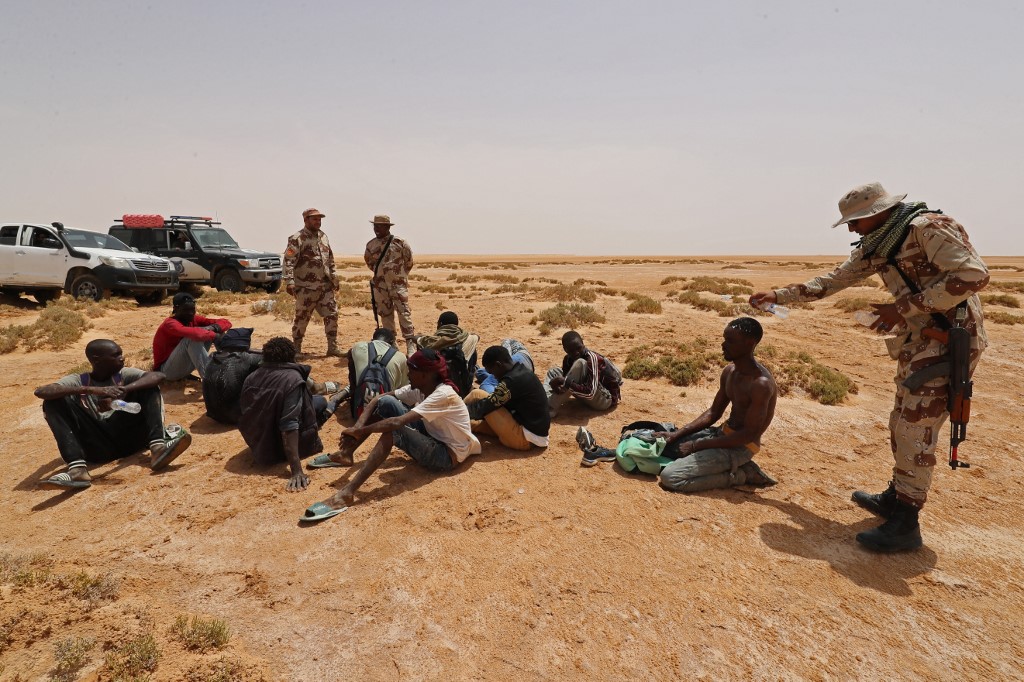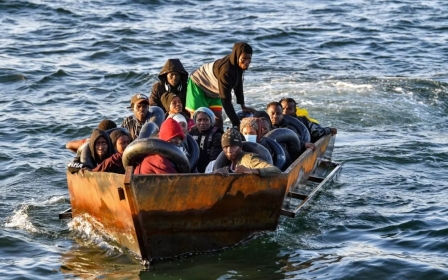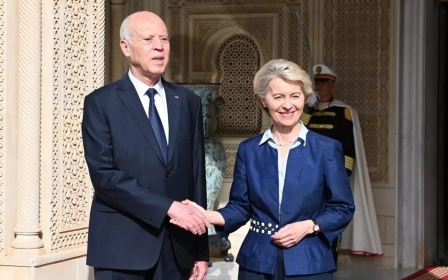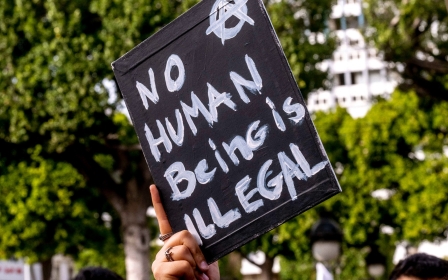'We were all raped': Tunisian security forces accused of abusing migrating women
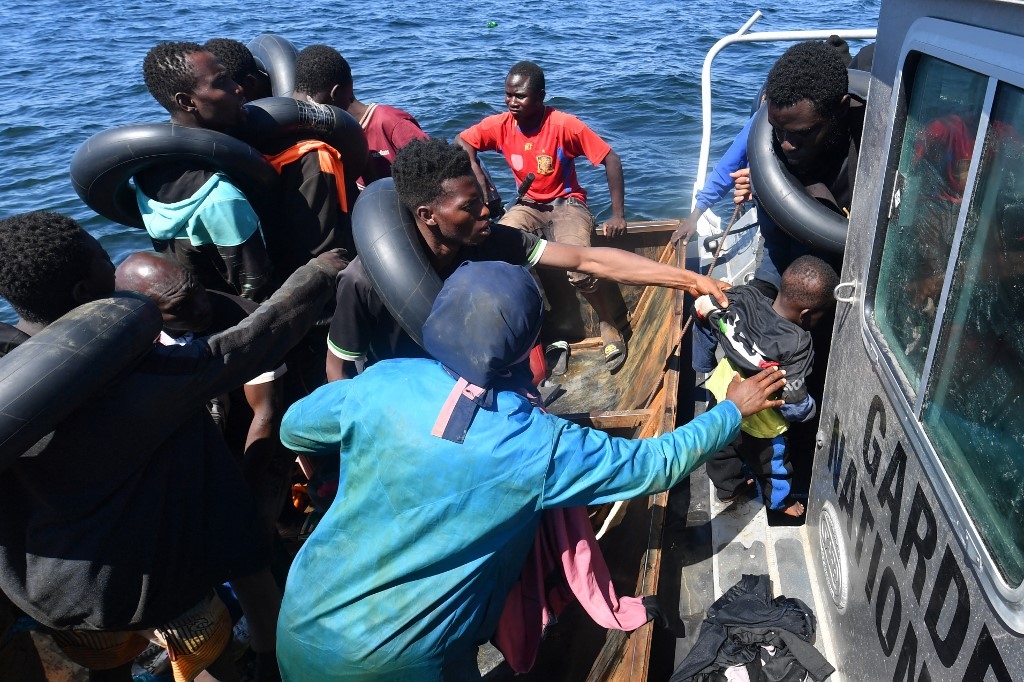
Rape, violence, kidnapping and extreme precariousness: these are the abuses people in transit in Tunisia to reach Europe are subject to amid increasingly difficult living conditions in the North African country.
In its October report "Torture Roads, mapping of violations suffered by people on the move in Tunisia", the World Organisation Against Torture (OMCT) noted "the emergence of a series of alarming new practices."
"The period November 2023-April 2024 saw a worrying increase in cases of sexual violence suffered by people on the move in Tunisia, committed with complicity of agents of the Tunisian security forces, or directly induced by the policy of forced displacement and deportation of vulnerable people," the report stated.
Middle East Eye met a survivor of these practices, Mariam*, a young Guinean woman in her thirties who is mother of a toddler. She arrived in Tunisia in 2021 and worked a series of odd jobs until 21 February 2023.
On that day, the Tunisian presidency published a statement in which Kais Saied linked people from Sub-Saharan Africa in the country to criminality, in comments that have been widely denounced as racist and conspiratorial.
New MEE newsletter: Jerusalem Dispatch
Sign up to get the latest insights and analysis on Israel-Palestine, alongside Turkey Unpacked and other MEE newsletters
"There is a criminal plan to change the composition of the demographic landscape in Tunisia, and some individuals have received large sums of money to give residence to Sub-Saharan migrants," the Tunisian president said.
In the following days, Tunisian employers and landlords, frightened by the possibility of being prosecuted for helping people staying illegally in the country, sent away their foreign tenants or employees.
Life turned upside down
Like many of them, Mariam saw her life turned upside down. Less than a year later, at dawn, from the governorate of Sfax, Tunisia's second largest city and the main departure point for Europe, the young woman boarded a small boat with her baby girl to attempt the crossing of the Mediterranean.
Thirty minutes after their departure, a boat from the Tunisian National Guard, the gendarmerie force which operates mainly in rural and peri-urban areas as well as land and sea borders, stopped them.
'The officers beat us with sticks and sprayed us with tear gas, then forced us to go behind the [border] fence and left'
- Mariam, a Guinean woman
"We asked for forgiveness, we begged them to leave us, but they wouldn't listen," Mariam told MEE.
She was brought back to the port with her 50 or so comrades.
A few months earlier, in the summer of 2023, a memorandum of understanding had been signed between the European Union - pushed by Italy, the main destination for people seeking to reach the continent - and Tunisia.
One of its five pillars concerns migration and provides for financial and technical aid to stem migration towards Europe.
The deal, vaguely worded, has been strongly criticised by human rights organisations in view of Tunisia's poor record in terms of freedoms.
While President Saied has always said that his country would not be Europe's border guard, on the ground, Tunisian coastguards appear to make important efforts to limit departures.
A year after the deal, in mid-October 2024, Italy's Prime Minister Giorgia Meloni was pleased with the results: the number of arrivals from Tunisia had decreased by 81 percent compared to the same period in 2023.
A few days earlier, on 14 October, independent UN experts had however denounced the endangerment of people intercepted by the Tunisian authorities while crossing the Mediterranean.
"For those who are 'rescued' by the coastguards, including victims of trafficking, their situation reportedly only worsens on disembarkation at ports," the experts said.
"Reports received include allegations of arbitrary forcible transfers to borders with Algeria and Libya, without access to humanitarian assistance, regardless of risks of dehydration, malnutrition or injuries suffered due to sunburn."
'They forced me in front of my baby'
After being brought back to the port by the Tunisian National Guard, Mariam's group was handcuffed and searched, while their phones were taken by security officers.
That same evening, the group was dropped off by bus at the Algerian border.
"The officers beat us with sticks and sprayed us with tear gas, then forced us to go behind the fence [which serves as a border] and left," Mariam told MEE.
Members of the group had managed to hide their phones. Thanks to geolocation, they hit the road again towards Tunisia.
The group reached the oasis town of Nefta, about 40 kilometres from the border, and settled in a date field. But they were denounced by a farmer whom they had asked for water.
The Tunisian National Guard arrived. Those who could escape did so. Mariam stayed with her daughter, nine other women and three children.
They spent the day in a prison cell before being sent back to the border that same evening.
The young woman took a deep breath before telling MEE the horror she went through.
"We were all raped, one after the other, in the van. They forced me in front of my baby," she told MEE, choking with tears.
She was then beaten and abandoned, with the rest of the group, in the middle of the desert.
Mariam has only her word to prove her story. But her testimony was confirmed by another woman raped that day in the van of the National Guard, Aissata.
The latter was assisted by the OMCT within the framework of the Sanad programme, which provides help to survivors of torture or inhuman or degrading treatment in Tunisia. The young woman's story was told in the organisation's February report.
Mariam and Aissata are not isolated cases. An activist from southern Tunisia told MEE he regularly helps migrating women who say they have been raped.
'I have accompanied at least ten women to have abortions. Some were raped by security officers, others by ordinary citizens'
- Tunisian activist
"I have accompanied at least ten women to have abortions. Some were raped by security officers, others by ordinary citizens," he said on condition of anonymity, since helping people in an illegal situation in Tunisia is liable to court proceedings.
"Sometimes, these rapes are accompanied by violence. Other times, they take place in exchange for food or simply for not being reported to the police," he explained.
The OMCT report points at the same phenomenon, indicating that it has, with its partners, collected "testimonies of sexual violence committed with the complicity of National Guard agents during the crossing of the Algerian and Libyan borders."
"Cases of sexual abuse by Tunisian citizens, in exchange for water and food, have also been reported to OMCT in the southwest of Tunisia, in the Tozeur region," the report added.
Likewise, UN experts "received reports of sexual abuse and exploitation of children, and of rape of women and girls as young as 10 years old around border areas".
Other testimonies from survivors were published by The Guardian in September. The British newspaper accused the EU of providing funds that go to "officers who are involved in shocking abuse, leaving people to die in the desert and colluding with smugglers."
The European Commission denies any direct funding to reduce departures to Europe. However, there are many programmes to train or equip Tunisian security forces, such as the National Guard. These projects are set up by NGOs or within the framework of bilateral agreements with EU member states.
Ana Pisonero, spokesperson for the European Commission, acknowledged it recently, while calling for an investigation. "Tunisia is a sovereign country," she said. "When there is any allegations of wrongdoing concerning their security forces, then of course, as partners of Tunisia, we would expect them to investigate these cases."
In October, Emily O'Reilly, the European ombudsman, considered in the conclusions of her inquiry on the respect of human rights in the context of the EU-Tunisia agreement that the European Commission "did not adopt a standalone human rights impact assessment before signing the memorandum with Tunisia, and it has not carried out standalone periodical assessments of the impact of the actions implemented under the memorandum."
The Tunisian authorities rejected the Guardian's allegations as "false and groundless," saying that their security forces operate with "professionalism to uphold the rule of law on [their] territory, while fully observing international principles and standards".
The interior ministry, which oversees the National Guard, had not replied to MEE's requests for comment by the time of publication.
Kidnapped by human traffickers
The ordeal of Mariam and her companions did not end there. In the middle of the desert, they were approached by two Sub-Saharan men who told them they were in the same situation and offered their help.
It turned out that they were human traffickers.
They took the group of women and children to Sfax with the help of Tunisians who acted as drivers. There, they were locked up in a building run by Sub-Saharan Africans, Mariam told MEE.
'I was threatened, slapped, prevented from sleeping, deprived of food and water,'
- Mariam on being held by human traffickers
"I was threatened, slapped, prevented from sleeping, deprived of food and water," she recalled.
The young woman however considered herself lucky: "I saw people being tortured, electrocuted."
After a week, Mariam's family in Guinea paid a ransom and she was released.
When MEE met the young woman a month later, she seemed lost. She was staying at friends' place and was visiting humanitarian organisations in Tunis in search of help.
She wanted to file a complaint, but was dissuaded from doing it.
"You can file a complaint for the kidnapping. Since the criminals are foreigners, that is not a problem. Besides, the security forces are aware of this phenomenon and take it seriously," advised an NGO employee during a well-meaning conversation witnessed by MEE.
"On the other hand, filing a complaint against the National Guard endangers you," he cautioned her.
In May, NGOs helping people in transit were targeted by a series of arrests.
Two executives of the Tunisian Refugee Council, the NGO that assists the United Nations High Commissioner for Refugees (UNHCR) in registering asylum seekers, were imprisoned.
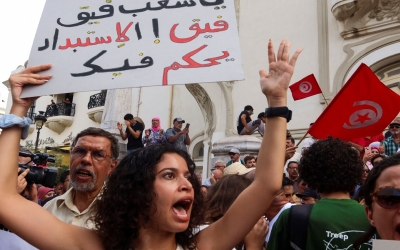
They are accused of threatening the country's national security for having launched a call for proposals to house 57 foreign unaccompanied children.
Since then, the Tunisian Refugee Council has ceased to operate and, as a consequence, the UNHCR stopped giving refugee cards to applicants.
Meanwhile, the Tunisian branch of the French NGO Terre d'Asile was investigated and has closed its door.
On 1 October, the UN special rapporteur on the situation of human rights defenders, Mary Lawlor, condemned this situation.
"This will only create fear and stigmatisation and may result in the suspension of life-saving activities, leaving hundreds of vulnerable persons in precarious conditions, particularly those from Sub-Saharan Africa who have been the target of attacks," she warned.
Even more isolated and hopeless, Mariam decided, at the beginning of the summer, to return to the Sfax region, where informal camps welcome candidates for departure to Europe. Her phone has been switched off for several months.
* The name has been changed for security reasons.
Middle East Eye delivers independent and unrivalled coverage and analysis of the Middle East, North Africa and beyond. To learn more about republishing this content and the associated fees, please fill out this form. More about MEE can be found here.



